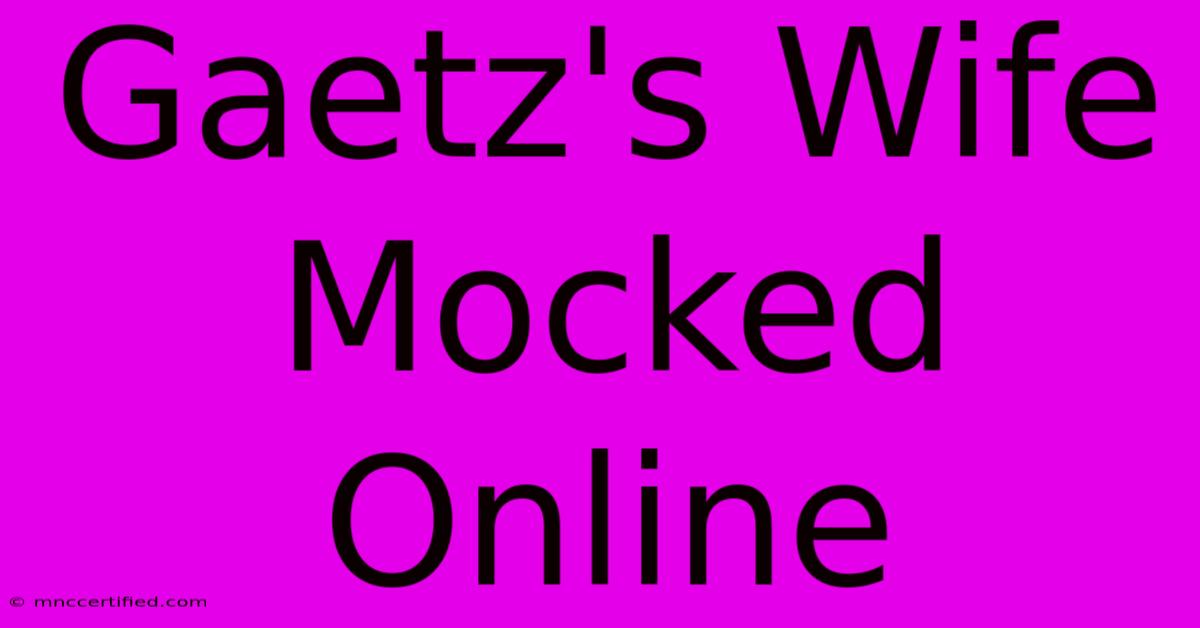Gaetz's Wife Mocked Online

Table of Contents
Gaetz's Wife Mocked Online: A Deep Dive into the Controversy
Matt Gaetz, the controversial Republican congressman, has frequently found himself at the center of public scrutiny. Recently, however, the criticism has extended beyond his political stances to encompass his wife, Ginger Gaetz. This article delves into the online mockery she has faced, exploring the reasons behind it, the ethical considerations involved, and the broader implications of such online attacks.
The Nature of the Online Mockery
The online mockery directed at Ginger Gaetz varies in its nature and intensity. Some instances involve criticism of her appearance, while others target her perceived role in her husband's political career. Social media platforms have become breeding grounds for these attacks, with memes, satirical posts, and outright insults circulating widely. The anonymity afforded by the internet often emboldens users to express opinions they might hesitate to voice publicly.
Keywords: Ginger Gaetz, Matt Gaetz, online mockery, social media attacks, internet harassment, political spouse, ethical considerations, online bullying, cyberbullying.
Underlying Reasons for the Attacks
The reasons behind the online mockery are multifaceted and complex. Many critics argue that Ginger Gaetz, by association with her husband's controversial political actions, becomes a legitimate target for public criticism. Matt Gaetz's outspoken and often inflammatory rhetoric has made him a lightning rod for controversy, and this negativity frequently spills over to his wife. Additionally, some online users might engage in such behavior due to a broader misogynistic or anti-establishment sentiment, using her as a proxy to express their anger towards her husband and his political affiliations.
Long-tail keywords: why is Ginger Gaetz mocked online, reasons behind online attacks on Ginger Gaetz, criticism of Matt Gaetz's wife, public reaction to Matt Gaetz's family, impact of political controversy on family.
Ethical Considerations and the Impact
The online mockery of Ginger Gaetz raises significant ethical concerns. While public figures often face criticism, extending such attacks to their spouses and families crosses a line for many. It’s crucial to distinguish between legitimate criticism of a politician's actions and the harassment of their family members, who are not directly involved in the political sphere. This behavior can contribute to a toxic online environment and potentially cause significant emotional distress to the individuals involved. The psychological impact of online bullying and harassment should not be underestimated.
Keywords: online harassment, cyberbullying, ethical implications, psychological impact, online abuse, freedom of speech, responsible social media use.
The Broader Implications
The case of Ginger Gaetz highlights a broader trend of online abuse directed towards the families of public figures. This practice raises questions about the boundaries of free speech and the responsibility of social media platforms to moderate content. It also underscores the need for increased awareness of the damaging effects of online bullying and the development of strategies to combat it effectively. The normalization of such behavior poses a threat to a healthy public discourse and can discourage individuals from entering public service.
Keywords: online abuse trends, social media responsibility, combating online harassment, public discourse, impact on public service.
Conclusion: Finding a Better Way
The online mockery of Ginger Gaetz is a troubling example of the negative aspects of the internet age. While freedom of speech is paramount, it should not be a shield for harassment and online abuse. Promoting responsible social media use, fostering empathy and understanding, and holding social media platforms accountable are crucial steps towards creating a more civil and respectful online environment. The conversation needs to shift from perpetuating negativity to finding constructive ways to engage in public discourse without resorting to personal attacks and online bullying. This incident serves as a reminder of the urgent need for greater digital literacy and ethical considerations in our increasingly interconnected world.

Thank you for visiting our website wich cover about Gaetz's Wife Mocked Online. We hope the information provided has been useful to you. Feel free to contact us if you have any questions or need further assistance. See you next time and dont miss to bookmark.
Featured Posts
-
Trumps Intelligence Briefings Commence
Nov 22, 2024
-
Maura Higgins Breaks I M A Celeb Silence
Nov 22, 2024
-
Panama Citizenship By Investment
Nov 22, 2024
-
Browns Shock Steelers Thursday Night
Nov 22, 2024
-
Pokemon Trading Card Storage Box
Nov 22, 2024